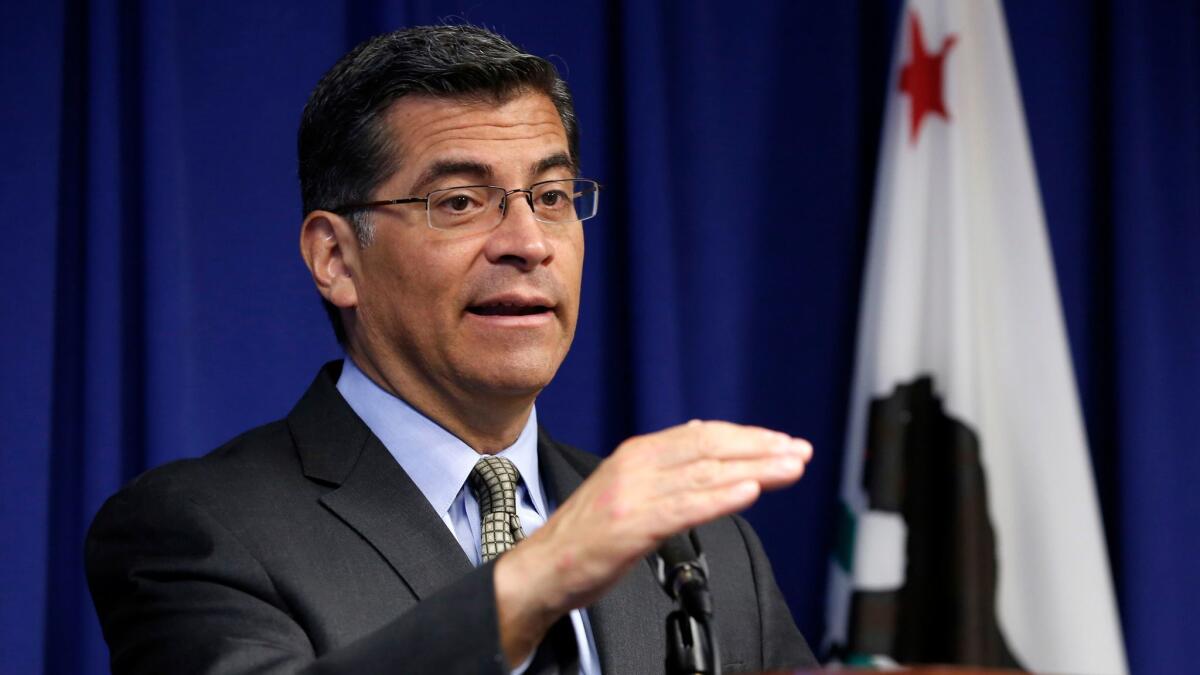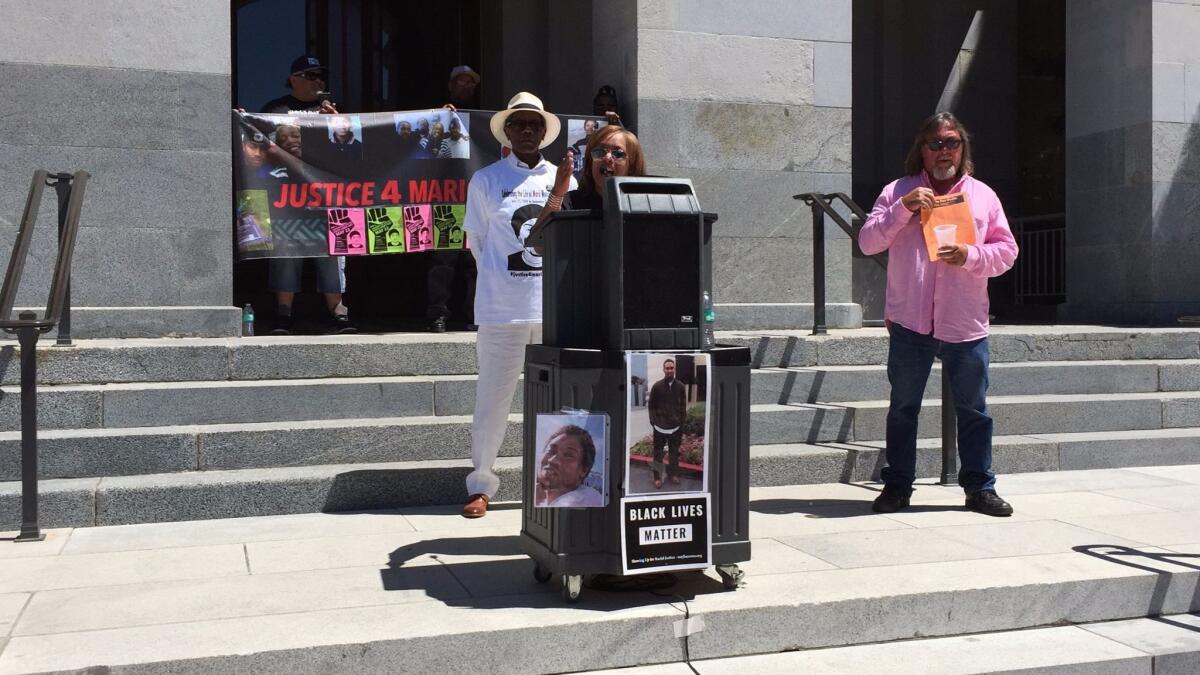California’s new top cop has to make some big policing decisions soon. No one knows what he’ll do

During his first four months as state attorney general,
But he has said little about an issue essential to his job as California’s top cop: policing.
Becerra’s relative silence and thin history on law enforcement oversight after more than two decades in Congress have left civil rights advocates and police groups both hopeful and concerned about his tenure. Will Becerra become an accountability crusader or reaffirm the longstanding deference the state has given local departments, prosecutors and officers to manage their affairs?
“He’s going to anger somebody,” Kern County Sheriff Donny Youngblood said. “We know that. He hasn’t made those decisions yet that somebody’s not going to like. But they’re coming.”
Already on Becerra’s plate is a civil rights investigation after years of complaints about police shootings by Youngblood’s department and Bakersfield’s. Becerra is also in charge of implementing a new law aimed at combating police racial profiling.
More broadly, Becerra’s opinions on officer-involved shooting investigations and public access to police disciplinary records and body camera footage could reshape how California handles law enforcement oversight at a time when the federal government is backing away from that role.
In an interview with The Times, Becerra said he expected to take a balanced approach on law enforcement issues — emphasizing that his primary goal is to make people feel secure by supporting police officers who act professionally, but holding accountable those who don’t.
“I don't want to be absent when the discussion is occurring,” Becerra said of police accountability. “I'd rather be on the field helping move the ball forward. More likely than not, you're going to find me active on policy.”
Under the Obama administration, the
But the Trump administration has signaled that similar interventions will be less frequent. The president and Atty. Gen.
The dramatic change in the Justice Department’s tenor has raised expectations from law enforcement and civil rights groups about how Becerra will respond. Michael Durant, president of the 69,000-member Peace Officers Research Assn. of California, which represents most rank-and-file officers in the state, said Becerra should follow Sessions’ lead.
“I’m hoping on the issue of supporting law enforcement, Atty. Gen. Sessions and Atty. Gen. Becerra will stand on the same side,” Durant said.
Civil rights advocates plan to pressure Becerra to fill oversight gaps left by the federal government.
“We’re going to be putting him to the test,” said Melina Abdullah, a professor of Pan-African Studies at Cal State L.A. and a member of the
The state has the power to launch civil rights investigations of police departments, but has seldom used it. The Kern County and Bakersfield probe — initiated just before Becerra’s predecessor,
Few details have emerged so far. Bakersfield’s police department has turned over numerous records to Becerra’s office, a police spokesman confirmed before declining further comment. Two weeks ago, state Justice Department investigators interviewed families whose relatives have been killed by officers, according to advocates in Kern County.
Activist groups and some members of the state’s Legislative Black Caucus criticized Harris for not being more active on policing issues, including opting against civil rights investigations after disputed police shootings and misconduct issues in Bay Area and Los Angeles departments.
Gwendolyn Woods, whose 26-year-old son, Mario, was killed by San Francisco police in late 2015, has renewed a request that Becerra investigate San Francisco’s department.
“When do you say humanity takes precedence over politics?” Woods said during a small rally of protestors outside the Capitol last month.
Becerra’s office declined to comment on the Kern County and Bakersfield investigation because it’s ongoing. But Becerra indicated he would become more involved in police oversight if the Trump administration stepped away.
“Any time the federal government fumbles and it's important for the interests and the protection of the people in this state, we'll be there ready to pick up their fumble,” Becerra said.

The new attorney general's big decisions on police oversight
As attorney general, Xavier Becerra has been mum on policing. But he has to make some key decisions soon.
| The Issue | The Challenge | The Status |
|---|---|---|
| The IssueA 2015 law requires the attorney general to write rules for all California police officers to track racial and other demographic data when they stop someone. | The ChallengeLaw enforcement groups are pushing back on the proposed regulations, saying they're overly burdensome. | The StatusBecerra's office expects to release revisions to the rules soon, but might not meet next April's deadline to implement them. |
| The IssueThe Department of Justice has opened a civil rights investigation into police in Kern County and Bakersfield after years of complaints about officer-involved shootings. | The ChallengeThe investigation, initiated by Becerra's predecessor less than two weeks before she left office, is just the third civil rights investigation of a police department in the state's history. | The StatusThe investigation is ongoing. |
Those looking for insight into Becerra’s views on police accountability won’t find much from his time in Congress. Federal lawmakers don’t often have to vote on law enforcement oversight issues.
Back in the early 2000s, civil rights groups criticized Becerra and other Los Angeles Latino political leaders for a muted response to the Rampart corruption scandal in the Los Angeles Police Department. At the time, Becerra said he wasn’t interested in bashing law enforcement because some officers went rogue.
.
Should Becerra want to pursue law enforcement oversight more aggressively, public opinion is moving that direction, said Fernando Guerra, director of the Thomas and Dorothy Leavey Center for the Study of Los Angeles at Loyola Marymount University. A recent Center for the Study of Los Angeles survey found that more than two-thirds of Los Angeles County residents agree with the aims of Black Lives Matter, including almost 60% of whites.
Still, in recent years Democratic lawmakers have split on many high-profile law enforcement issues, leaving a stalemate that has favored that state’s strong police officer protections. California is one of three states to prohibit the release of officer discipline information, even in cases of confirmed misconduct, and a bill last year to loosen those restrictions failed. Lawmakers also have deadlocked on statewide standards for police body cameras, and most departments don’t release footage outside of a courtroom.
Becerra has met repeatedly with law enforcement and advocacy groups since he’s taken office to understand their concerns. That approach could help the Legislature resolve such disputes, said Assemblyman Reggie Jones-Sawyer (D-Los Angeles), who heads the Assembly Public Safety Committee.
“Whether it’s body cameras, policing, grand juries, we’ve hit loggerheads in some of these and we haven’t been able to move it,” Jones-Sawyer said. “I think Xavier Becerra may be the one to break the logjam.”
Becerra has yet to weigh in on one bill that could dramatically change officer-involved shooting investigations in California. The measure from Assemblyman Kevin McCarty (D-Sacramento) would create a new department in Becerra’s office to handle these investigations if local prosecutors requested the assistance. McCarty has said he wants to sever the perceived conflict of interest between district attorneys who rely on local police for their cases. The Rev.
Becerra will have to make key decisions on another hot-button topic. Police officers across the state will soon have to track the perceived race and other demographic data when they pull over cars or stop pedestrians. The effort, created through legislation passed two years ago, is an attempt to prevent police racial profiling. Becerra is responsible for writing the regulations.
The rules were supposed to be finished before Becerra took office in January. But a proposal written by an advisory board has come under strong criticism from law enforcement groups. They expect Becerra to scale back the information that officers need to track before the rules become final.
Becerra told lawmakers during his January confirmation hearing that, as a teenager, police officers pulled him over without giving a reason while he was driving with two friends who were also Latino.
That incident, he said, informed how he sees law enforcement issues. But so has meeting with the families of police officers who have been killed in the line of duty.
“Having been pulled over when I was a kid for no reason and handing a flag to the spouse of a fallen officer, somewhere in between there's a right way to do things,” Becerra said.
ALSO
For attorney general nominee Xavier Becerra, immigration is a personal issue
Civil rights groups alarmed at Justice Department's review of local police settlements
Deadly shootings prompt state civil rights probe of Kern County, Bakersfield policing
Get the L.A. Times Politics newsletter
Deeply reported insights into legislation, politics and policy from Sacramento, Washington and beyond. In your inbox three times per week.
You may occasionally receive promotional content from the Los Angeles Times.








